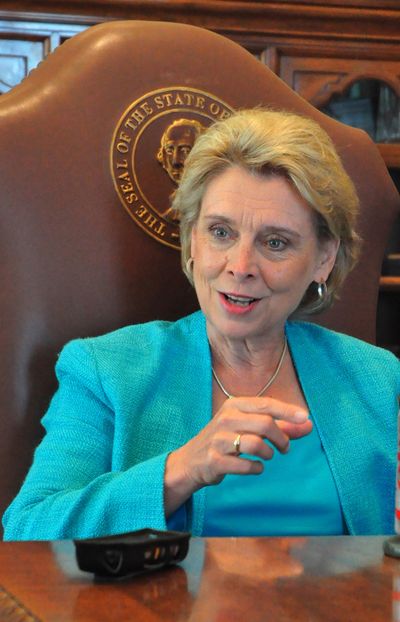No Washington special session – for now
Gregoire says fed money eases budget

OLYMPIA –With Congress poised to approve $26 billion for Medicaid and school funding, Washington state will dodge the need for a special legislative session or immediate across-the-board spending cuts, Gov. Chris Gregoire said today.
State officials are still waiting to see if tax revenue dips in August and if the economic forecast in September contains more bad news, Gregoire said. She could still order state agencies take smaller cuts.
But at this point, expected action by Congress is likely to leave the state with money in the bank at the end of the 2009-’11 biennium.
“What we clearly have done is avoid a special session,” Gregoire said at a mid-morning press conference. “We won’t face the kind of draconian cuts we were facing.”
Senate Majority Leader Lisa Brown, D-Spokane, said legislators could now concentrate on changes for the next biennium: “I’m pleased that we can put an end to the dread and speculation of the kind of dramatic steps legislators and the governor would or would not have to take in the worst-case scenario.”
Some Republicans and conservative budget analysts, however, said the state should still have a special session, and soon, to get started on cuts and structural changes dictated by the bad economy.
“We’re liable to have a real problem when we come back in January,” said state Sen. Mark Schoesler, of Ritzville, the Republican floor leader. “Every month you wait to take action, it’s harder.”
Jason Mercier of the Washington Policy Center said the state dodged “a short-term bullet,” but still faces a $3billion gap between spending and tax revenue in the next biennium: “Rather than party too hard with these new one-time federal funds, state officials should keep focused on making the necessary reforms to transform state spending.”
The bullet apparently was dodged because early Wednesday, two U.S. Senate Republicans joined Democrats to cut off any prospect of a filibuster of an amendment offered by U.S. Sen. Patty Murray, D-Wash., to send the states an extra $16 billion in federal medical assistance percentages, or FMAP, and $10 billion for education programs, which she called the “last, best chance” to ease state budget crises and save teachers’ jobs.
Republicans in Congress fought previous proposals because they would add to the deficit unless the budget was cut elsewhere. Even though the states desperately needed the money, that was a legitimate concern, Murray said Wednesday. The amount of the final amendment was reduced and balanced by a series of small, targeted cuts in many programs and agencies.
The state should not count on a similar infusion of federal cash next year, Murray warned. “I think under these very difficult, challenging times … next year is going to be harder.”
The amendment, which needs only a simple majority to pass, goes to a vote in the Senate today. House Speaker Nancy Pelosi said she will call the House back from its August recess to vote on the proposal next week.
Washington state counted on receiving some $480 million as its share of FMAP funding when the Legislature passed the supplemental budget. The money wasn’t allocated to any programs, but was set aside as the state’s ending fund balance to carry into the next biennium. As Congress struggled to approve the money, the state also received reports that tax revenue was below projections and the state faced a possible deficit.
Washington’s constitution requires a balanced budget, and the state had two options: The governor could cut most general fund programs outside of basic education in equal amounts, or call a special session, which she said she would only do if legislative leaders could find consensus on what to cut and agree to get the work done in two or three days.
Republican leaders called for a special session. Democratic leaders, however, told Gregoire they couldn’t agree to a plan.
“There was no consensus, that’s fair to say, among legislative leadership,” she said.
The state is also expected to get an estimated $205 million in education funding under the Senate bill. That money can be used for salaries for teachers or other school workers, but can’t be used for general expenses or to create a fund balance, a spokesman for Murray’s office said.